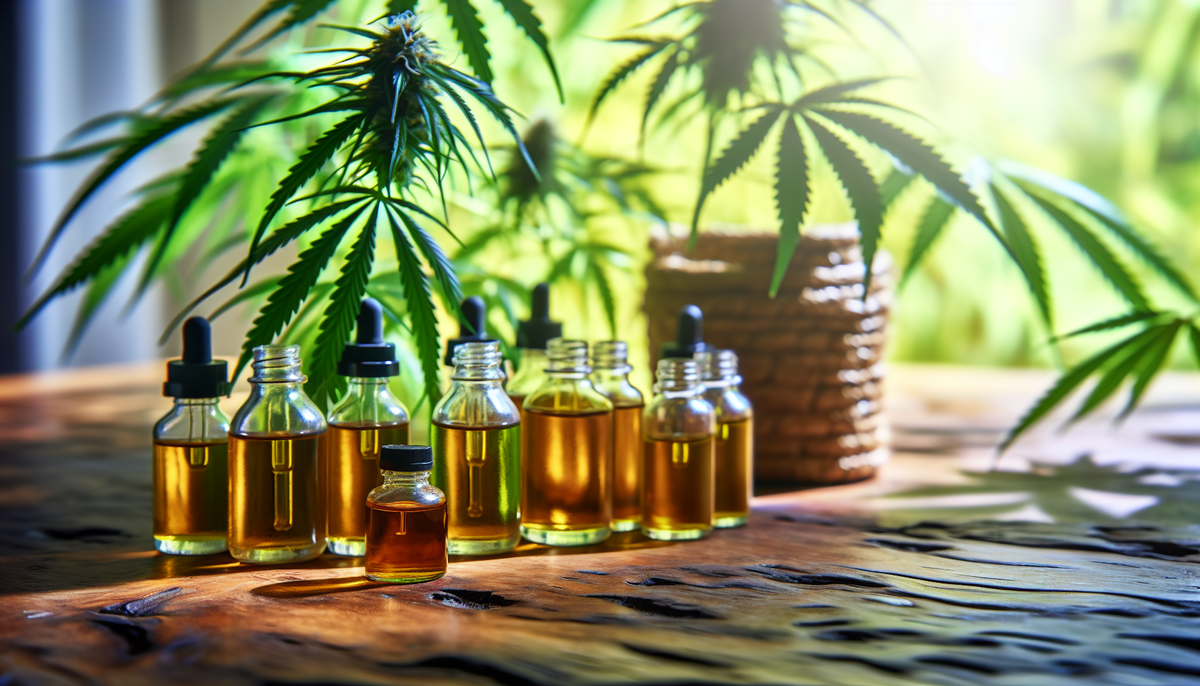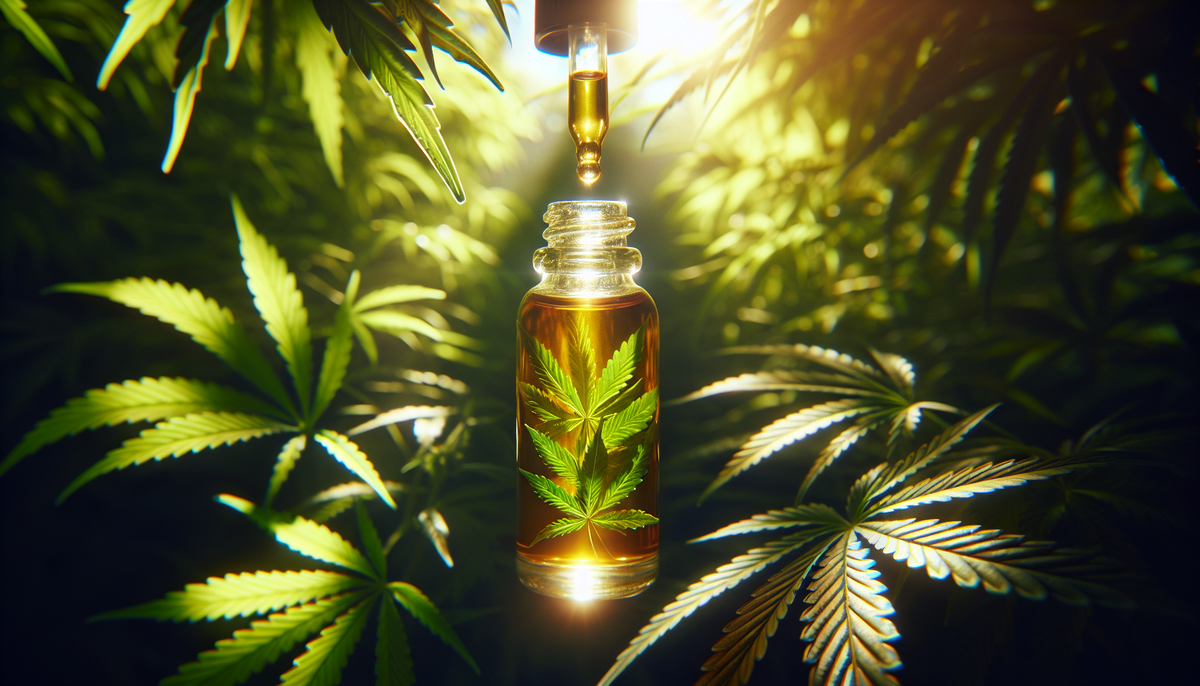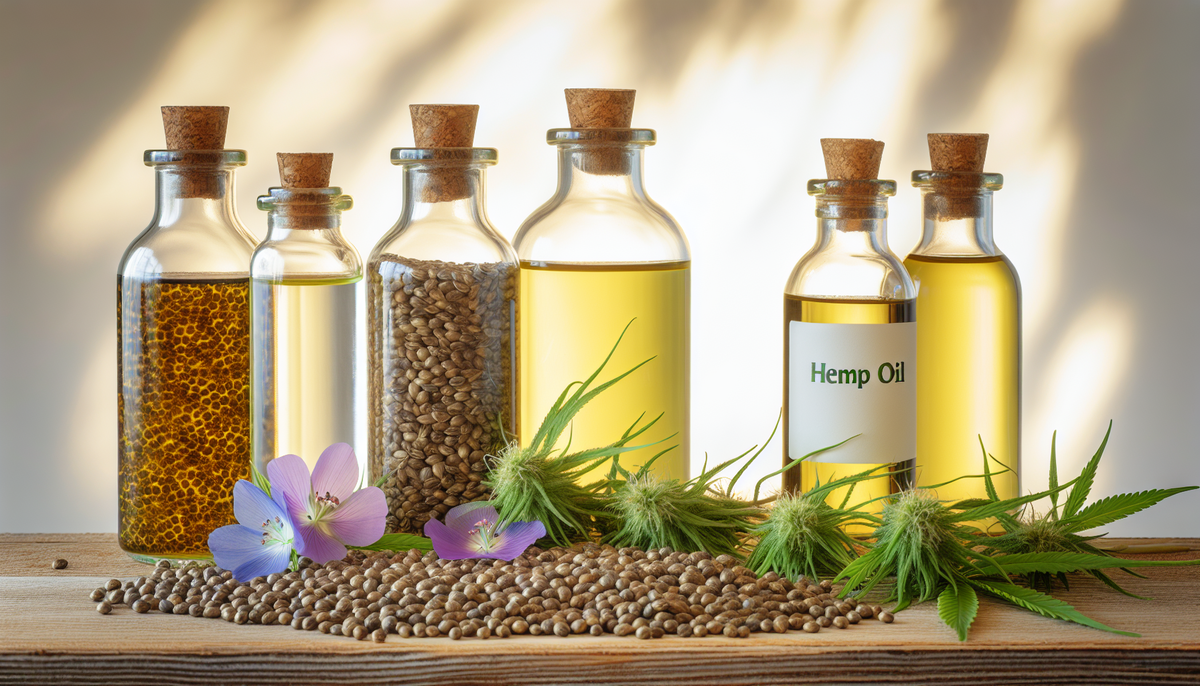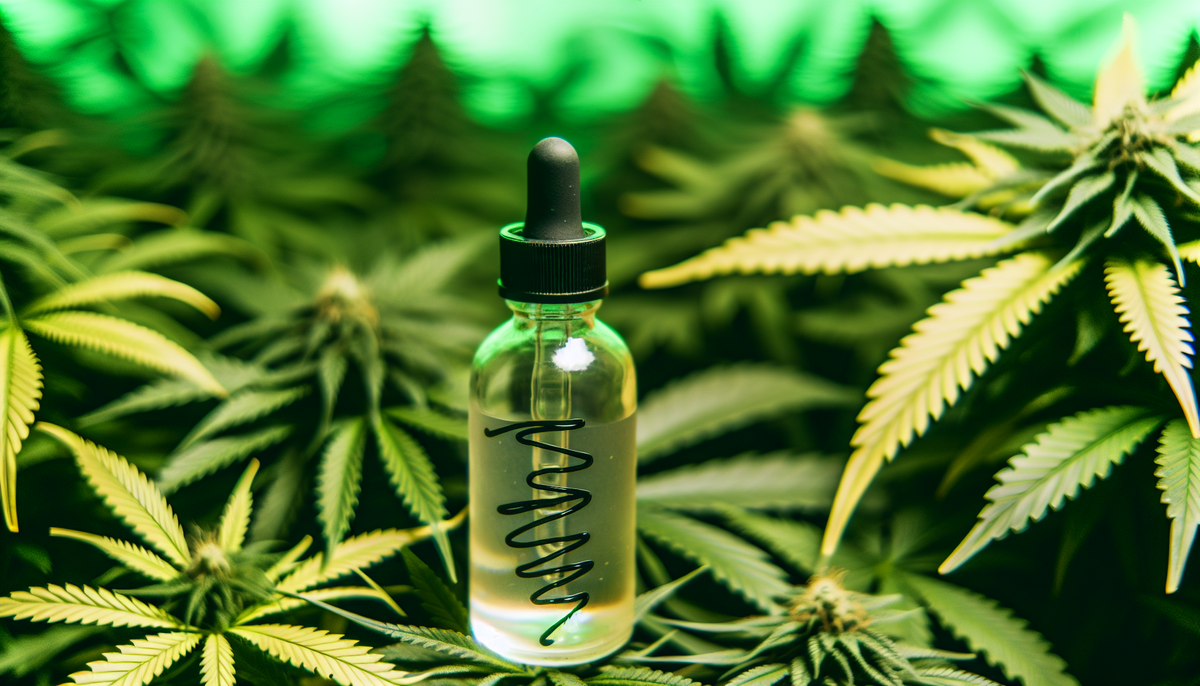Top Health Benefits of Hemp Extract
Written by: Hunter Podell, Subject Matter Expert and Website Founder
Published: March 15, 2024; Last updated: April 6, 2024
- 1. Key Takeaways
- 2. Understanding Hemp Extract
- 2.1 The Extraction Process
- 2.2 Legal Limitations
- 3. Health Benefits of Hemp Extract
- 3.1 Natural Pain Relief
- 3.2 Cardiovascular Health
- 3.3 Skin Health and Acne Treatment
- 4. Hemp Seed Oil vs. Hemp Oil
- 4.1 Dietary Hempseed Oil
- 4.2 Hemp Oil Applications
- 5. Full Spectrum Hemp Extract
- 5.1 Advantages of Full Spectrum Extract
- 5.2 Potential Risks and Side Effects
- 6. Choosing the Right Hemp Extract Product
- 6.1 CBD Oils and Tinctures
- 6.2 Topical Products
- 7. Summary
- 8. Frequently Asked Questions
- 8.1 Is hemp extract the same as CBD?
- 8.2 What does drinking hemp extract do?
- 8.3 Can hemp extract make you sleepy?
- 8.4 What is hemp oil extract good for?
- 8.5 What are the benefits of hemp extract?
- 9. References
Are you exploring hemp extract? Understand its role in wellness, with benefits spanning from pain management to skin and heart health. Unlike CBD alone, hemp extract captures a full spectrum of hemp plant benefits. This guide will unpack the multifaceted health potential of hemp extract, explain the differences from related products, and help you make informed choices without the usual jargon or hyperbole.
Key Takeaways
Hemp extract is a full-spectrum concentrate from the hemp plant, offering a range of health benefits due to the ‘entourage effect’ of its myriad components, including cannabinoids, terpenes, and essential oils.
Hemp extract has potential health applications, including natural pain relief, cardiovascular health improvement, and skin conditions treatment, through its interaction with the body’s endocannabinoid system.
Choosing the suitable hemp extract product involves understanding the differences between hemp seed oil and hemp CBD oil, considering desired benefits, and assessing factors like brand reputation, transparency, and third-party lab testing for quality assurance.
Understanding Hemp Extract

Hemp extract is a concentrated form of the hemp plant, a variety of cannabis known for its low THC content. It’s not to be mistaken with CBD. At the same time, CBD is a component of hemp extract; the latter encompasses the entire array of elements from the hemp plant, providing a well-rounded assembly of benefits. This full-spectrum extract is derived primarily from the flowers of the hemp plant, while the rest of the plant, known as hemp biomass, serves other purposes.
Recognizing the diversity of hemp extract is critical. It’s not just about CBD; it’s about the symphony of components that work in harmony. This includes other cannabinoids, terpenes, and essential oils that all contribute to the overall health benefits of hemp extract. This harmony, often referred to as the ‘entourage effect,’ enhances the therapeutic benefits of each component, providing a well-rounded wellness boost.
The Extraction Process
Next, we’ll explore the meticulous process of extraction. The journey from hemp plant to hemp extract is a meticulous process. It begins with selecting the right hemp plant, which is carefully picked, trimmed, dried, and ground to prepare it for optimal cannabinoid release. But how are these precious cannabinoids extracted?
The extraction process primarily relies on two methods: ethanol and supercritical CO2 extraction. While both are effective, the CO2 extraction method is particularly safe and environmentally friendly, producing potentially stronger CBD extracts. It’s akin to the extraction of essential oils and seed oils, requiring meticulous methods to ensure the potency and purity of the final product. ¹
Legal Limitations
The numerous benefits of hemp extract come with a complex legal landscape that cannot be overlooked. Following the 2018 Farm Bill, hemp cultivation was legalized, defining hemp as cannabis with no more than 0.3% THC on a dry weight basis. This means that hemp-derived CBD products must also contain less than 0.3 percent THC to comply with federal legality in the United States.
Despite this progress, the FDA has yet to approve the vast majority of cannabis-derived or CBD products, except Epidiolex, a prescription drug. This lack of FDA oversight means that many nonprescription CBD products are not FDA-approved and can sometimes be inaccurately labeled. Thus, confirming CBD product quality through third-party lab reports, which ensure the absence of harmful contaminants, is advisable.
Health Benefits of Hemp Extract

Despite the complexity of the hemp extract world, the impressive health benefits of this compound stand out. From natural pain relief to cardiovascular health and skin treatment, hemp extract is making waves in the wellness industry. Its interaction with the body’s endocannabinoid system and neurotransmitters can impact inflammation, pain, mood regulation, and stress response, highlighting a complex interaction with the body’s central regulatory system.
We should further explore the benefits of hemp oil. We’ll dive into how hemp extract can relieve chronic pain, boost cardiovascular health, and improve skin health. These are just a few ways hemp extract can enhance your well-being and improve your quality of life.
Natural Pain Relief

One of the most celebrated benefits of hemp extract is its potential for natural pain relief. How does this work? CBD, a key component of hemp extract, interacts with the receptors of the endocannabinoid system, helping to maintain overall wellness and regulate bodily functions. This includes anti-inflammatory and pain-relieving effects.
CBD’s interaction with the body can limit inflammation, offering benefits for pain experienced in conditions like arthritis, neuropathy pain, and muscle spasms associated with disorders such as multiple sclerosis.
Moreover, full-spectrum CBD, which includes a combination of CBD and THC, may provide enhanced pain relief due to the entourage effect. Even topical applications of CBD, such as creams, have significantly reduced inflammation and signs of pain.
Cardiovascular Health
The benefits of hemp extract extend beyond pain relief. It also has heartening implications for cardiovascular health. CBD, a key component of hemp extract, may help reduce high blood pressure, contributing to improved cardiovascular health. ²
The potential benefits of CBD for cardiovascular health include:
Reducing inflammation within the cardiovascular system, which may have a preventative role against heart-related illnesses
Having a protective effect on the heart, potentially benefiting patients after a heart attack or those with heart damage due to diabetes
Being studied for its potential in treating various heart and circulatory diseases, using purer forms of CBD
These findings underscore the potential of CBD in promoting cardiovascular health.
Skin Health and Acne Treatment
Hemp extract isn’t just good for your insides; it profoundly affects your skin. One of the key benefits lies in its anti-inflammatory qualities, which contribute to treating acne by regulating sebum production and reducing inflammation. ³
Clinical evidence suggests that a cream with 3% cannabis seed extracts can effectively treat skin diseases by reducing skin redness and inflammation, extending benefits to conditions such as psoriasis and eczema besides acne. Even more, research supports the therapeutic potential of CBD creams for dermatological conditions, including acne, psoriasis, eczema, arthritis, and peripheral neuropathy. This makes hemp extract a promising treatment for a variety of skin conditions.
Hemp Seed Oil vs. Hemp Oil

Having explored the benefits of hemp extract, it’s essential to differentiate between hemp seed oil and hemp oil. These two often get mixed up, but they are different. Hemp seed oil is similar to olive oil in that it is extracted from the plant’s seeds. Both oils have their unique benefits and uses. It’s high in Omega-3 and Omega-6 content but contains only trace levels of cannabinoids, like CBD.
On the other hand, hemp CBD oil is extracted from the flowers of the hemp plant and is rich in cannabinoids, including CBD, which are responsible for many reported health benefits. These differences highlight the importance of carefully reading labels to ensure you purchase the desired product.
Dietary Hempseed Oil
If you want to add some nutritious value to your diet, hemp seeds and their byproduct, hempseed oil, might be what you’re searching for. This oil is bursting with essential fatty acids, including polyunsaturated ones: linoleic acid, alpha-linolenic acid, and gamma-linolenic acid, all recognized for their health benefits. Hemp seed oil strengthens your body by providing these vital nutrients.
One tablespoon of hempseed oil provides a substantial amount of total fat (14 grams) with a low amount of saturated fat (1 gram) and high levels of monounsaturated and polyunsaturated fats. Due to its high unsaturated fatty acid content, it should be used in cold dishes, such as salad dressings, and should not be heated to high temperatures.
The gamma-linolenic acid (GLA) in hemp seed oil can reduce inflammation, potentially relieving symptoms of inflammatory conditions like rheumatoid arthritis.
Hemp Oil Applications
Hemp oil, on the other hand, has a range of applications that extend beyond dietary benefits. It can be used as an alternative to traditional cooking oils, consumed straight, or mixed into foods like salad dressings to enhance flavor. It’s also a prevalent ingredient in cosmetic products, found in soaps, creams, lotions, and lip balms. It can also be applied topically or as a carrier oil.
Historically, hemp seed oil served as a widely used lighting oil, and now it is incorporated into products such as paints, varnishes, and cattle feed. CBD oil, with its mild taste, can be baked into foods or added to drinks to infuse them with the health benefits of hemp without an overpowering flavor.
Full Spectrum Hemp Extract

Our focus now shifts to full-spectrum hemp extract, a form of hemp oil rich in various cannabinoids and terpenes. This includes:
CBG
CBC
CBN
and others
These cannabinoids, found in the cannabis sativa plant, contribute to its overall effectiveness.
Combining these cannabinoids and terpenes in full-spectrum hemp extract is believed to produce the entourage effect, where the compounds work synergistically for enhanced benefits. Despite containing cannabinoids, full-spectrum hemp extract has only a trace amount of THC and is not intoxicating.
Advantages of Full Spectrum Extract
The entourage effect in full-spectrum CBD oil enhances the product’s overall efficacy due to the synergistic interaction between cannabinoids and terpenes. Full-spectrum CBD contains a full range of naturally occurring compounds from the cannabis plant, including cannabinoids, terpenes, and flavonoids, which may contribute to its therapeutic benefits.
Terpenes present in full-spectrum hemp extract can augment the effects of cannabinoids, providing benefits such as relaxation, stress relief, and increased energy and focus. Owing to the presence of additional cannabis plant compounds, full-spectrum CBD may offer a more significant effect compared to pure CBD isolates.
Potential Risks and Side Effects
Despite the numerous benefits of full-spectrum CBD, awareness of its potential risks and side effects is essential. These may include liver injury, drowsiness, diarrhea, decreased appetite, and mood changes such as irritability and agitation. Topical application of CBD can cause tiredness, diarrhea, changes in appetite or weight, and contact dermatitis. ⁴
Moreover, full-spectrum CBD could lead to positive drug test results due to the presence of THC, presenting concerns for individuals undergoing regular testing. It’s also important to note that full-spectrum CBD interacts with medications such as blood thinners, potentially causing adverse effects or reducing the effectiveness of the medicines. These potential risks emphasize the need for more research and user caution.
Choosing the Right Hemp Extract Product
Given the wide range of choices, selecting a suitable hemp extract product might appear overwhelming. However, the choice largely depends on intended use, personal preferences, and the brand’s reputation. Whether you’re looking for topical applications or oral ingestion, the suitability of the CBD form should align with your needs and lifestyle.
Assessing a brand’s reputation and transparency is essential, considering factors like adherence to industry standards and customer feedback. This can provide a degree of assurance in selecting the right product that will deliver the desired effects.
CBD Oils and Tinctures
A wide variety characterizes the realm of CBD oils and tinctures. CBD oil can be sourced from:
isolate, which contains only CBD
broad-spectrum, which includes additional cannabinoids excluding THC
full-spectrum extracts that contain all cannabinoids, including THC.
The choice between CBD oil and CBD tincture is subject to personal preference. Here are some key differences to consider:
CBD oil offers versatility, as it can be added to food or drinks, applied topically, or taken sublingually.
CBD tinctures provide ease of use with pre-dosed applications. They usually come with a dropper for precise measurement.
CBD oil is generally well-tolerated, with formulations and strengths varying to meet individual needs. Some products offer at least 50 mg of CBD per serving.
Choosing CBD oil and CBD tincture depends on your specific needs and preferences.
Topical Products
Topical CBD products like creams, balms, and salves can provide localized relief for skin conditions and muscle soreness. Consistent application of CBD topicals directly on the desired skin area leads to better effectiveness.
Choosing the right topical product involves considering factors like:
Budget
Personal goals
CBD type
Third-party testing
Potency
Environmental impact
Ingredient clarity
Alternatives to CBD in topicals like arnica, ostrich oil, and honey offer different therapeutic benefits for pain relief and skin health.
Summary
As we conclude this journey through the hemp extract world, we hope you’ve gained a deeper understanding of its diverse benefits and applications. The possibilities with hemp extract are vast, from natural pain relief to cardiovascular health, skin treatment, and beyond. It’s also important to note the differences between hemp seed oil and hemp oil and the unique characteristics of full-spectrum hemp extract.
Choosing a suitable hemp extract product requires careful consideration of your needs, preferences, and brand reputation. Despite the potential risks and side effects, the health benefits of hemp extract are promising. As research continues to explore this natural wonder, we can look forward to even more exciting discoveries.
Frequently Asked Questions
Is hemp extract the same as CBD?
Hemp extract and CBD are not the same. Hemp extract comes from the seeds of the hemp plant and contains little to no CBD, while CBD oil is extracted from the leaves, flowers, and stalks of the hemp plant.
What does drinking hemp extract do?
Drinking hemp extract can promote relaxation and reduce the effects of anxiety, depression, PTSD, and insomnia. Studies have shown it to have these benefits.
Can hemp extract make you sleepy?
Hemp extract does not contain cannabinoids that cause sleepiness, and its calming effect is attributed to essential fatty acids such as omega-3 and omega-6, which may have relaxation effects.
What is hemp oil extract good for?
Hemp oil extracts are good for nourishing the skin and protecting it from inflammation and aging, and they may also help reduce inflammation in the body. Some studies suggest potential benefits for conditions like Alzheimer’s and cardiovascular disease, but further research is needed.
What are the benefits of hemp extract?
Hemp extract may provide natural pain relief, improved cardiovascular health, skin health, and acne treatment.
References
Lazarjani, M. P., Young, O., Kebede, L., & Seyfoddin, A. (2021). Processing and extraction methods of medicinal cannabis: a narrative review. Journal of cannabis research, 3(1), 32. https://doi.org/10.1186/s42238-021-00087-9
Stanley, C. P., Hind, W. H., & O’Sullivan, S. E. (2013). Is the cardiovascular system a therapeutic target for cannabidiol?. British journal of clinical pharmacology, 75(2), 313–322. https://doi.org/10.1111/j.1365-2125.2012.04351.x
Peyravian, N., Deo, S., Daunert, S., & Jimenez, J. J. (2022). The Anti-Inflammatory Effects of Cannabidiol (CBD) on Acne. Journal of inflammation research, 15, 2795–2801. https://doi.org/10.2147/JIR.S355489
Iffland, K., & Grotenhermen, F. (2017). An Update on Safety and Side Effects of Cannabidiol: A Review of Clinical Data and Relevant Animal Studies. Cannabis and cannabinoid research, 2(1), 139–154. https://doi.org/10.1089/can.2016.0034

Written by Hunter Podell - Subject Matter Expert and Website Founder
Hunter has 8+ years of experience as a content writer and digital marketer. Earning his chops marketing in the healthcare space for over 5 years, Hunter is extremely familiar with the rules and regulations required to deliver high quality content that answers the user's needs while adhering to strict guidelines.
Join the CBDeals Club!
Get 10% off your first order and receive our best and exclusive promotions directly to your inbox!



